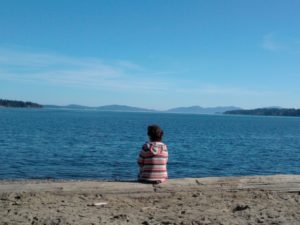
For whatever we lose (like a you or a me)
it’s always ourselves we find in the sea. —e.e. cummings
I spent most of the first weekend in October at Transfer Beach in Ladysmith, BC. The weather was brilliant; sunny and warm with no hint of a wind, leaves gradually changing color on the far shore. Autumn’s slow and sensual yet very corporeal beginning. As I sat neat the water, I was struck by the silent ritual at hand. On arriving, most people went to the water’s edge, looked around or dipped their hand in the water, and then sat down on the grass, benches, or logs, gazing at the horizon, in silent communion with the scenery and internal processes. There is something about the sea which helps process life’s challenges. There are other ways of doing this too; the common thread is connecting to a deeper part of your being. Frieda Ferrick calls this “connecting to your authentic self.” In my work with couples I call this process “emotional shifting.” Whatever the name, reconnecting to your natural state of being can help you face life’s peaks and valleys, but first you have to get past the instinct to steer away from the emotionally uncomfortable.
Connecting to your authentic self does not mean subscribing to an illusion that no problem is ever a problem, an artificial bubble where nothing can bother you. Nature abhors a bubble and life will certainly intervene in dramatic ways. In my work with couples, I often see one or both people in the relationship stay away from conflict because it has created problems in the past. The conflict-avoider(s) can become upset if anything threatens the calm. I’m sure you see how ironic this is—trying to avoid anything unpleasant is itself conflict-generating. Although you cannot avoid problems in life, you can access a deeper intelligence which helps you choose how you respond.
In Japanese the word Shizentai (自然体) translates roughly as “one’s natural posture”; it describes the natural, relaxed yet attentive and curious state that is each person’s birthright; our inner nature which mirrors the external one we so need. From this posture of our natural being, problems, conflict, grief, or pain can be processed without the additional burden of secondary emotional reactivity. Holding this posture all the times, however, would be artificial. As in meditation, the goal is not to try and maintain a state which, in reality, can only ever be momentary. Instead, life is about reconnecting to your natural state of repose again and again—the process of reconnection is what one aims for, because when you can reconnect, you are not pushed or pulled around so much by the crisis of the moment.
Dealing with life’s storms is a matter of returning to your authentic state as individual, couple, parent, employer or employee. Some ways you can reconnect include:
- Writing: a diary, journal, poem, or note.
- Walking—in nature, at the beach, in the woods, downtown during your lunch hour. As humans our physiology is made for walking more than any other activity, and it can put us in touch with internal rhythms.
- Making a cup of tea; gardening.
- Reading something engaging and enlightening.
- Meditation, prayer, spiritual practice.
- An engaging conversation of self-exploration, as in psychotherapy.
A ritual or routine for reconnecting can help you know where your baseline is and make it easier to return to it when a crisis hits, but you cannot get up and make a cup of tea in the middle of a typhoon. In counselling, I help clients learn to connect to their natural ground in the moment. I do this with couples by bringing them back to the moment of intense emotional disconnect and creating a pause. The pause allows a subtle shift in awareness to occur–a quality of awareness in tune with their deeper relationship. Different options then present themselves.
Individually, you can do this too. When emotions seem at their highest, use the intense feeling as a signal to pause and reconnect to your authentic self. Have you ever been held by an idea, a twinkling of important and unbiased knowledge about yourself; something that resonates as truth (versus something you are emotionally reactive to)? If you followed the cookie crumb trail, you reconnected to your essential nature. There is palpable shift when you pause and follow the hint, arriving at an important understanding, where a deeper sense of wisdom manifests. The process of returning to your stable self-ground changes how you approach life challenges.
The ability to connect to a deeper awareness is like a muscle—the more you use it the stronger it becomes. When you are caught up in the emotions of the moment you tend to struggle and can make things worse. When you reconnect with your authentic self, what Kosho Uchiyama calls “your real life,” you face issues without the extra baggage of emotionally-generated reactivity. The more you reconnect, the more you see that life’s crisis are like waves—they reach an emotional peak but do not last. You learn to trust a deeper intelligence that knows you can get through the crisis.
In going to the beach you renew yourself through reconnecting with your deeper nature, and the world’s. Life is no beach, but a visit there sure helps.
